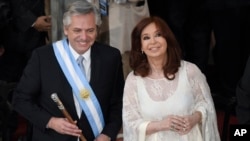Alberto Fernandez assumed the presidency of Argentina on Tuesday, returning the country to the ranks of left-leaning nations at a moment of right-wing resurgence in the Western Hemisphere.
Taking the vice presidency was Cristina Fernandez, 66, a polarizing figure who served as president from 2007 to 2015 and whose presence has raised questions about the extent of her influence in the new administration.
Alberto Fernandez, a 60-year-old lawyer from the country's center-left Peronist movement, faces the grave and immediate challenge of trying to pull Argentina from economic crisis: The country has a 35% poverty rate and is struggling to make debt payments on time.
The economy is expected to shrink 3% by the end of 2019, with inflation at 55%.
“I come before you to call for unity from all Argentina, to build a new social contract of brotherhood and solidarity,” Fernandez said in his inaugural address before Congress. “I come before you calling for all to put Argentina on its feet, to put the country on a path toward development and social justice.”
He said that his administration's first meeting would focus on reducing hunger, and said that Argentina wanted to pay all its creditors but lacked the capacity to do so.
Outgoing leader Mauricio Macri became the first non-Peronist president to complete his term in 74 years, a landmark seen as a sign of Argentina's maturing democracy.
The new president said on Twitter that he would dedicate himself to “putting my dear Argentina back on its feet.”
Alberto Fernandez served as head of Cristina Fernandez's Cabinet for the beginning of her time in power and many wonder if the new vice president will wield outsized power in the new government. She and Alberto Fernandez have denied that.
However, close allies of Cristina Fernandez have already been named to key government positions and her son is head of the governing party in the lower house of the legislature.
Peronists cheered as the pair were inaugurated, saying they had high hopes for an improved quality of life.
“I see a lot of people unemployed, a lot of hunger, and that is very frustrating,`` said Claudia Pouso, a 57-year-old retiree. I want everything to be turned around, more jobs for people. My daughter works in the hospital and there is nothing there. ... Everything needs to change.”
Outgoing Interior Minister Rogelio Frigerio praised Alberto Fernandez's conciliatory attitude toward his political opponents, and his openness toward dialogue.
“We have to give the next government the benefit of the doubt, he needs help and we will help,” Frigerio said.
The incoming president has already announced plans to fight poverty with the distribution of subsidized basic foods, and he has outlined measures to lower food prices and fight malnutrition in poor families.
He has also announced plans to raise retirees' pensions and increase benefits for public employees and welfare recipients.
Alberto Fernandez is expected to move Argentina away from close cooperation with the U.S. and other conservative governments that are trying to unseat Venezuela's embattled socialist president, Nicolas Maduro.
Fernandez is close to former left-leaning Brazilian leader Luiz Inacio Lula da Silva and Mexico's populist president, Andres Manuel Lopez Obrador. Meanwhile, tensions have been rising between Fernandez and far-right President Jair Bolsonaro of Brazil, which Argentina's main trading partner.
Alberto Fernandez Inaugurated as President of Argentina




